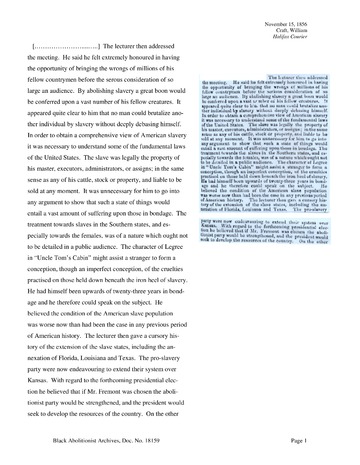(page1).jpg.jpg)
Title: Colored American - August 1, 1840
Speaker or author: editor
Newspaper or publication: Colored American (1837 - 1842)
The writer alerts his readers to the August 1st celebration that will take place later that day. He reminds his readers that the British West Indies were emancipated on this date.
Description of file(s): one scanned newspaper column
(page1).jpg.jpg)
Title: Colored American - July, 1838
Speaker or author: editor
Newspaper or publication: Colored American (1837 - 1842)
The writer announces that the idea of apprenticeship as a way to slowly emancipate slaves in the British West Indies has been abandoned. As of August 1st, the slaves of the British West Indies will be completely emancipated.
Description of file(s): one scanned, one columned, newspaper page
(page1).jpg.jpg)
Title: Colored American - June 16, 1838
Speaker or author: editor
Newspaper or publication: Colored American (1837 - 1842)
The writer explains that when the British Parliment first passed the Emancipation Act to free the slaves of the British West Indies, they tacked on an apprenticeship of six years to the deal. This was done out of fear of what may happen if the thousands of slaves were freed at once. The islands, however, rejected this clause and provided their slaves with immediate emancipation. The feared violence never manifested. It is now up to Parliament to revise their law.
Description of file(s): one scanned, one columned, newspaper page
(page1).jpg.jpg)
Title: Colored American - November 16, 1839
Speaker or author: editor
Newspaper or publication: Colored American (1837 - 1842)
The writer compares and contrasts voluntary immigration to the western states and various other countries with the restrictions and demands of Colonization. While voluntary immigration can be useful to a society, scheme's like Colonization work against it.
Description of file(s): two scanned, two columned, newspaper pages
(page1).jpg.jpg)
Title: Colored American - October 5, 1839
Speaker or author: editor
Newspaper or publication: Colored American (1837 - 1842)
The writer encourages his readers to ensure that their children have a well-rounded education. He suggests a "good English education" with the possibility of apprenticeship afterwards. He emphasizes that this is the best path towards a positive future.
Description of file(s): one scanned newspaper column

Speaker or author: Craft, William
Newspaper or publication: Halifax Courier
Speech regarding the current political opinion on the question of continuing slavery in the U.S. by legalizing it in new states. The speaker also related his own experience with slavery and his subsequent escape.
Description of file(s): PDF 3 page, 962 word document (text and images)



